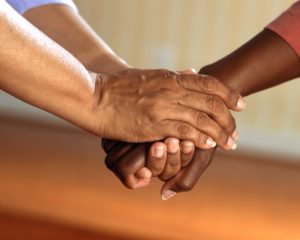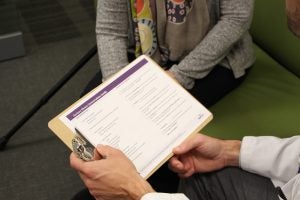 For many people facing serious illness, religious belief can offer an important source of strength and hope in difficult times. Despite the clear importance of religion in the lives of many Americans, physicians may view it as a barrier to meaningful conversations about end-of-life care, and struggle to reconcile religion’s role in the context of a scientific approach to medicine.
For many people facing serious illness, religious belief can offer an important source of strength and hope in difficult times. Despite the clear importance of religion in the lives of many Americans, physicians may view it as a barrier to meaningful conversations about end-of-life care, and struggle to reconcile religion’s role in the context of a scientific approach to medicine.
Research led by Dr. Justin J. Sanders, Assistant Director of Innovation for the Serious Illness Care Program at Ariadne Labs, confirmed these differing perspectives on religion’s role in advance care planning conversations in a 2019 study.
The paper concludes, however, that instead of viewing religion as a barrier to advance care planning, clinicians can look to this cultural asset to better understand the patient’s values.
Sanders, who is also an attending physician in the Psychosocial Oncology and Palliative Care department at the Dana-Farber Cancer Institute and the Brigham and Women’s Hospital, believes a simple question can help physicians do just that:
“What gives you strength as you think about the future with your illness?”
This question gives physicians an opening to incorporate religious beliefs into meaningful, patient-centered conversations when planning for an uncertain future.

The question is one part of the Serious Illness Conversation Guide, created by palliative care experts at Ariadne Labs. The guide offers clinicians language to ask seriously ill patients about their goals, values, and wishes and is one element of Ariadne Labs’ multi-component Serious Illness Care Program.
Sanders, whose work at Ariadne Labs focuses on disparities in serious illness care, has long pushed for end-of-life conversations that create space for whatever values matter most to the patient — whether that’s religion, family, or something else entirely.
“Having a serious illness conversation isn’t about code status or procedures but really focuses on goals, fears, and strength. It’s a game-changing conversation,” says Sanders. “Such conversations are particularly important among patients who are disempowered or marginalized because these are the questions that they are not used to hearing.”
The Rev. Gloria White-Hammond, a physician and co-pastor of Bethel/AME Church in Boston, and an advocate for serious illness conversations says that allowing a place for religion in serious illness conversations is often particularly important in African-American communities where the church is a cornerstone of cultural life.
Ironically, even pastors often have trouble talking about end of life with congregants, White-Hammond says. But discussing what matters most can help people coping with a poor medical prognosis. For many people, what matters most is faith, even to the point of praying for a miracle.
“Those people are not in La-La Land,” says White-Hammond. “That’s part of their identity. That’s who they are. And the medical or pastoral professional should not argue with that.”
Both Sanders and White-Hammond believe that religion and spirituality can be an asset, not a barrier, to meaningful, realistic discussions.
Likewise, Dr. Erik K. Fromme, an Ariadne Labs faculty member in the Serious Illness Care Program, sees faith as an asset. “The stronger the faith (which is different from belief) the better prepared the patient and family are to deal with difficulty,” he says.
Physicians reaching out to patients with serious illnesses should expand their notions of healing, says White-Hammond. “There are multiple ways in which God can be healing; some of that is physical. And some of that is emotional,” she says. Both physicians and pastors need to understand the concept of miracles in the African-American community, she says. “The notion of miracle is such a prevalent part of our theology and ways of thinking.”
“On the one hand, we believe God can work miracles. On the other hand, we have to be aware of survival rates for cancers and other illnesses,” she says. “I’ve seen lots of things that totally defy the survival rates and then things that really did line up.”
That attitude was reflected in a 2016 study conducted by Sanders and other researchers. A participant noted, “The doctor doesn’t really know when someone is going to die. Only the Lord knows. I put my faith in God and until He says it’s time for me to go on to Glory, I want the doctors to do all they can to keep me alive.”
That study concluded that black Americans are more likely to receive worse end-of-life care than white Americans, which negatively impacts end-of-life planning,
“The way in which racism plays out in health care is just shocking,” says Sanders, noting that disparities in prevention, diagnosis and treatment for African Americans results in general distrust of medical personnel.
“History is on their side. There’s 400 years of well-earned mistrust that African Americans bring with them in their encounters in health care settings,” Sanders says. “We have a lot of work to do to earn their trust.”
One way is to show respect for deeply held beliefs. “Miracles are inherently non-scientific,” Sanders says. “We in medicine tense up when we hear the word miracle – especially when we know that it’s not likely to happen. But you can couple your hope for a miracle with realistic statements about what you’re really worried about. People will then trust that you are only trying to help them and preparing them if the miracle doesn’t happen.”
Fromme says his approach to faith and serious illness conversations has changed over the years, “but my basic approach is to find out what makes meaning for the patient and feed it,” he says. If clinicians feel uncomfortable, “I would recommend they practice curiosity and respect around someone who takes their faith seriously. It’s hard to be uncomfortable when you are practicing curiosity and respect.”
He adds, “As Rev. Gloria taught me ‘It’s not the tool, it’s the ‘tude!’”
By Stephanie Schorow


